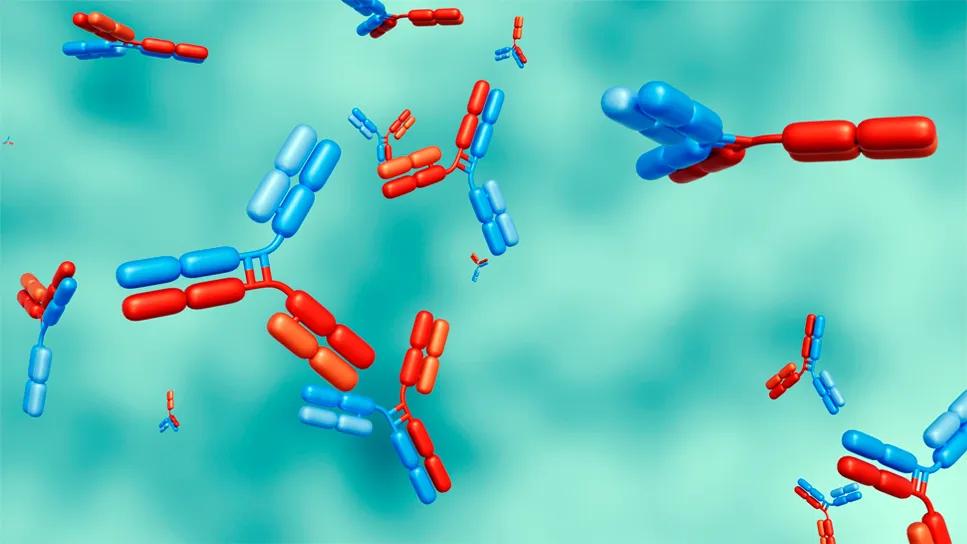Study measures real-world outcomes for relapsed or refractory large B-cell lymphoma

Image content: This image is available to view online.
View image online (https://assets.clevelandclinic.org/transform/05e4d93a-1f1b-4968-956a-f84546eeac13/bispecific-t-cell-engagers-realbite-2167502117)
3D rendering of bispecific antibodies
With standard frontline R-CHOP therapy, approximately two-thirds of patients with diffuse large B-cell lymphoma (DLBCL) can be cured. For patients who relapse, high-dose chemotherapy together with autologous progenitor cell rescue and CD19-directed chimeric antigen receptor (CAR) T-cell therapy may result in durable remissions.
“However, the prognosis is poor for patients who are not candidates for aggressive salvage chemotherapy and for those who relapse after two or more lines,” says Taylor R. Brooks, MD, an oncologist at Cleveland Clinic Cancer Institute.
The T-cell-engaging bispecific antibodies epcoritamab (Epco) and glofitamab (Glofit) are promising options for patients with relapsed or refractory large B-cell lymphoma, as evidenced by their accelerated approval by the US Food and Drug Administration (FDA) for the treatment of DLBCL in 2023. Not only do these drugs have encouraging response rates, but they also generate lower rates of severe cytokine release syndrome (CRS) and neurotoxicity compared to CAR T-cell therapies.
Two pivotal trials, EPCORE NHL-1 and NP30179, were the foundation for these agents’ FDA approval. “Naturally, with increasing uptake into clinical practice following drug approvals, there is increasing interest in assessing the efficacy and safety of these drugs in real-world, non-trial settings,” Dr. Brooks says.
This was the inspiration for the multi-center, retrospective cohort study on real-world outcomes with epcoritamab and glofitamab for relapsed or refractory large B-cell lymphoma that Dr. Brooks led and presented at the 2024 American Society of Hematology annual
Advertisement
Cleveland Clinic is a non-profit academic medical center. Advertising on our site helps support our mission. We do not endorse non-Cleveland Clinic products or services. Policy
The study included more than 200 patients with relapsed or refractory aggressive B-cell lymphoma at 20 academic centers throughout the United States, and reported their outcomes from treatment with epcoritamab or glofitamab between January 2023 and October 2024. The median follow-up was 7.6 months.
Compared to the patients in the FDA clinical trials, patients in this study who received bispecific antibodies, especially epcoritamab, tended to be older, but there were no differences between the two agents regarding sex, lymphoma diagnosis, the number of prior lines of therapy or the presence of certain unfavorable clinical features such as “double-” or “triple-hit” lymphoma.
“Only about 30% of our population would have been eligible for the clinical trials that led to the approvals of epcoritamab and glofitamab,” says Dr. Brooks. “The cohort we described was enriched for patients with advanced stage disease, relapses after CAR T-cell therapy and high-grade lymphomas compared to the clinical
Of the 122 patients in the cohort who were tested for expression of CD20 on their tumors before bispecifics, nearly all (87%) had detectable levels of this important therapeutic target. The overall response rate for both agents was 50% to 60%. The complete response rates were similar—around 25% for epcoritamab and approximately 30% for glofitamab.
The median progression-free survival was two months for epcoritamab and five months for glofitamab, while the median overall survival for epcoritamab was seven months and for glofitamab was 11 months. Patients who lost CD20 expression before bispecific therapy were also found to have inferior survival rates.
“Interestingly, patients treated with epcoritamab exhibited a numerically shorter progression-free and overall survival compared to those who received glofitamab, though these differences didn’t reach statistical significance.” Dr. Brooks notes. “These agents work by similar mechanisms and are analogous in the way that they’re dosed, and we didn’t anticipate that there would be any differences in outcomes between the two. We are cautiously interpreting these findings and really trying to drill down on whether there might be differences between the patients who received Epco and the patients who received Glofit, and whether those differences may impact the outcomes.
Advertisement
Over 50% of patients who received epcoritamab and 38% of those who received glofitamab experienced cytokine release syndrome (CRS), mostly grade 1 to 2 events. Three patients had fatal CRS, and one had fatal immune effector cell-associated neurotoxicity syndrome (ICANS) after being treated with epcoritamab. Thirteen patients had infectious complications that became fatal, nine of whom were treated with epcoritamab and four of whom were treated with glofitamab.
Traditional trials typically exclude patients who are older, who have comorbidities or who are on various medications, making real-world data that includes these patients crucial in understanding how specific treatments function in various populations.
“Insights from studies like ours can help clinicians identify which treatments are most effective in routine practice and for specific populations of patients, allowing for more personalized care,” says Dr. Brooks. “It can be very challenging to treat patients who have lymphoma that has returned after multiple lines of therapy. Bispecific antibodies are being used in a variety of different ways as standalone therapies, but also as a bridge to more definitive therapies.”
Dr. Brooks and his team intend to accumulate more subjects and data to their cohort so they can glean more detailed data regarding clinical characteristics and outcomes from a larger sample size.
“As bispecific antibodies become more commonly integrated into everyday practice, it’ll be important to collect these kinds of data to find out what the best strategies are for treating this challenging group of patients,” Dr. Brooks says.
Hear our recent podcast about treating relapsed/refractory large B-cell lymphomas with bispecific antibodies.
Advertisement
Advertisement
Addressing rare disease and challenging treatment course in an active young patient
Optimized responses in transplant- and CAR T-cell therapy-eligible patients
CAR T-cell therapy, bispecifics and antibody drug conjugates have changed disease management
Global R&D efforts expanding first-line and relapse therapy options for patients
Two thirds of patients responded to CAR T-cell therapy
62% of patients were progression-free at 18 months post-transplantation
Distinct molecular features found in five subtypes of disease
Patients who relapse early after first-line chemotherapy are often, but not always, refractory to second-line chemotherapy